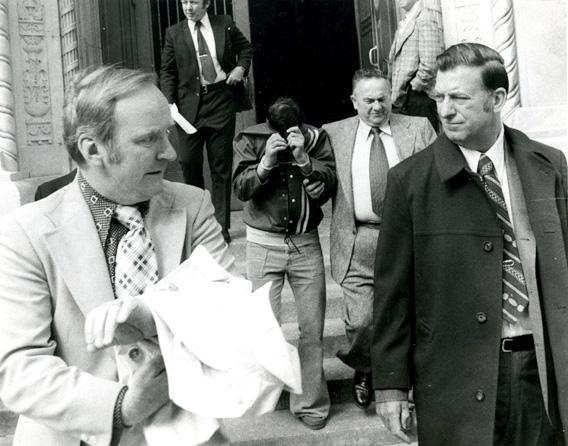When Stephen Flemmi gets agitated on the witness stand, he starts to sniff. Nostril-flaring little rabbit twitches, furtive and quick. He stumbles over his own words, gulping air, losing syntax.
“You want to pick certain things that are so negative,” sputters Flemmi to defense attorney Hank Brennan, halfway through a brutal cross-examination. “Why don’t you hear the positive things so you can balance it out and get the whole story?”
That seems fair. So, in the interest of balance …
Positive things: Flemmi sometimes bought stuff for the women in his life and paid for them to go on vacation or to rehab.
Negative things: He also murdered them and extracted the teeth from their corpses.
I suppose it’s no surprise that a psychopathic killer would have trouble accepting responsibility for his actions. Yet I’m stunned at how Flemmi can contort himself to deflect blame. After his de facto stepdaughter, Debbie Hussey, became an “embarrassment” due to her sordid behavior around South Boston, Flemmi says it was Whitey Bulger who insisted they had to kill her. So Flemmi drove her to the murder site, stopping along the way to take her shopping. (“You thought the last moments of her life would be best spent shopping with you?” asks Brennan with more than a hint of cheek.) Flemmi watched idly as Whitey strangled her. Then Flemmi stripped her naked, yanked her teeth, and buried her in a basement.
If he didn’t want to do any of this, why didn’t he ditch the shopping trip and just urge Hussey to run or put her on a bus to Canada? Why did he let Whitey kill her?
“He could have at any time prevented that,” says Flemmi of Whitey. “He could have said, ‘Pass.’ Four little letters. I would have been so happy, and that would have been the end of it. All he had to say was ‘pass,’ and she’d be alive today.”
Leaving aside for a moment the odd lingo—as though sparing an innocent woman’s life is akin to making a strategic play in bridge—it’s baffling to me that Flemmi felt powerless to resist Whitey’s orders. Flemmi had killed many people before he ever met Whitey. He was “a capable man,” as the gangsters say. He was armed and aggressive, militarily trained, physically bigger than Whitey.
But again and again he makes it clear that Whitey called the shots. Flemmi was a patsy, in his retelling. Everything he did was a result of a hive decision, and Whitey was the queen bee. “You buried her in that floor?” asks Brennan at one point. “We,” clarifies Flemmi. “W-e. It was a concerted effort.”
Group dynamics are a helluva thing. Elsewhere in this same courthouse, Dzhokhar Tsarnaev is facing trial for despicable acts that—as best I can tell—might never have happened without the radicalized influence of his brother, Tamerlan. This in no way exculpates Dzhokhar, just as Flemmi’s subordination to Whitey is no excuse. But it’s chilling to ponder these knotted, gnarled marriages of madmen. How seemingly mundane and justified the very vilest behavior can appear when you are dancing a pas de deux with a violent lunatic.
Of course, Flemmi was doing just fine on his own when it came to killing and needed no encouragement. But—stuck in prison for life, with little else to contemplate—it’s clear he still views every facet of his past through a Whitey-tinted loupe. Asked if he knew that his sexual relationship with the teenage Hussey was wrong, Flemmi jarringly answers, “So did Mr. Bulger! He had a young girlfriend, 16 years old, that he took to Mexico. That’s a violation of the Mann Act!” Asked how a pedophile might be treated in jail, he again glances at Whitey: “You wanna talk about pedophilia? Right over there at that table.”
Flemmi has shown precious few flashes of humanity over the past two days. Perhaps the closest he’s come is when Brennan displays a photo of Hussey’s skull. “I’ve never seen this before,” says Flemmi. “I don’t really want to look at it. There’s things I don’t want to remember.”
Brennan turns off the projector. It’s almost enough to make you think Flemmi might have feelings. Until you remember that moments before, Brennan asked whether Hussey had been buried in an unmarked grave, and Flemmi pointed out, matter of fact, “It wouldn’t have made sense to mark the grave.”
The Irish gangsters, the Italian wise guys, the FBI, the DOJ, the squabbling attorneys, gawking media wags like me: No one is coming out of this trial looking pretty. These jurors might need years of therapy. Hour after hour, day after day, they’re presented scenes of senseless gore, narrated in excruciating detail by a series of mouth-breathing demons.
“You don’t understand the underworld at all, nothing,” a frustrated Flemmi says to Brennan at one point. “I’m giving you the real world.”
